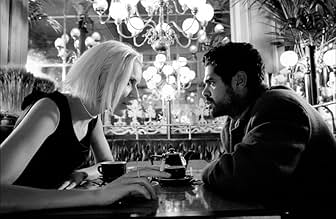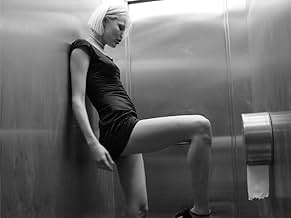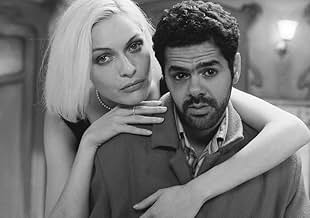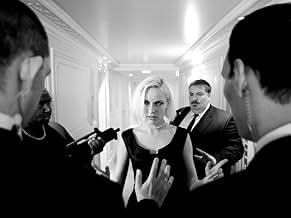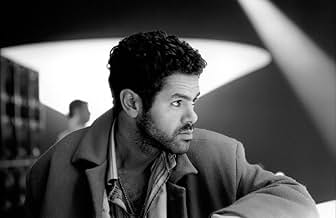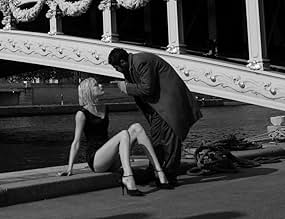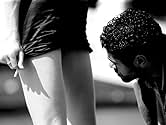PUNTUACIÓN EN IMDb
7,0/10
37 mil
TU PUNTUACIÓN
Una bella mujer ayuda a un estafador un poco inepto a tener éxito.Una bella mujer ayuda a un estafador un poco inepto a tener éxito.Una bella mujer ayuda a un estafador un poco inepto a tener éxito.
Franck-Olivier Bonnet
- Le dernier client
- (as Franck Olivier Bonnet)
Jean-Marc Montalto
- Le réceptionniste
- (as Jean-Marco Montalto)
Reseñas destacadas
Besson's intention by directing this movie was good. There is, it seemed to me, a big effort to make his film deep considering the discourse. It can be perceptible through the plenty of plays with symbols that are contained in it. The main problem is that by writing such dialogs, certain scenes seem too artificial and often too long. This has to be added to the fact that if you see the film in french, you"ll quickly notice that the dialogs that often concern both J Debbouze and Rie Rasmussen are more than sometimes incomprehensible and require a permanent attention to decipher them. Rie Rasmussen, even if she's quite a wonderful creature on a physical aspect, is however an average actress and the scenes that deal with emotions are spoiled -this is rather surprising considering Besson's job on The Professional- by a clumsy actor's direction. However cinematography by Thierry Arbogast is astounding and foreigners will find a wonderful black and white postcard of Paris as they'll see the movie. It is also regrettable that Besson didn't appeal to Eric Serra for the soundtrack. For Besson's defense, it must be said, I think, that his staff and himself have worked in such constraining circumstances to shot in Paris that the number of shots was counted and couldn't allow actors to give their full potential. This is the first time also that a director has full access to production and budget resources by himself so he can write a screenplay that does not have to be selected by instances like CNC allowing himself to direct a personal but too poorly "collaborative" project. Anyway, this is a film that has definitely to be seen.
Angel-a can be described as a romantic comedy, as a movie about angels and as one about therapy. As a romantic comedy it is a good and charming film, which stands far away from the omnipresent and boring Hollywood romantic comedies. As a movie about angels it is not convincing, and the best it can be said in its favour is that the movie is an heterodox rendering of angels, half divine and half too-human.
But the best use that can be given to this film is to adopt it as a manual of cognitive or rational-emotive therapy. A well respected field within psychology, cognitive therapy looks for transforming distorted thinking, which it is said, affects the mood, the behaviour and the life of people. That is simply what Angel-a does with Andre, giving him reasons to love himself, and teaching him techniques to change the way he thinks or speaks of himself. If we go to cinema some times to enjoy ourselves and some times to bring something to our lives, this movie allows us to do both. Art and cinema have also ethical consequences -in the sense of Foucault- giving us clues about how to live our lives better. In this sense the best description of Angel-a is given above by Elizabeth Arthur when she says that this is "a film about learning to love yourself".
Only one question remains: Why a director like Besson, who has been making movies about violence, decides to read about cognitive therapy and bring angels to earth and make a film like this?
But the best use that can be given to this film is to adopt it as a manual of cognitive or rational-emotive therapy. A well respected field within psychology, cognitive therapy looks for transforming distorted thinking, which it is said, affects the mood, the behaviour and the life of people. That is simply what Angel-a does with Andre, giving him reasons to love himself, and teaching him techniques to change the way he thinks or speaks of himself. If we go to cinema some times to enjoy ourselves and some times to bring something to our lives, this movie allows us to do both. Art and cinema have also ethical consequences -in the sense of Foucault- giving us clues about how to live our lives better. In this sense the best description of Angel-a is given above by Elizabeth Arthur when she says that this is "a film about learning to love yourself".
Only one question remains: Why a director like Besson, who has been making movies about violence, decides to read about cognitive therapy and bring angels to earth and make a film like this?
First, to all you grumpy smurfs who are slamming Besson for "ripping off [...]", chill out! Don't you recognize a pastiche when you see one? If you bear that in mind, you'll thoroughly enjoy this carefree ride through angel territory, whether it's Frank Capra's funny cliché of meeting a suicidal angel by diving off a bridge, Wim Wender's suggestion that angels must always be filmed in black & white, or possibly even a touch of Christopher Walken's good-angel-bad-angel gimmick from The Prophecy, it's all in there plus more. Most of all, I think Besson tips his hat to the classic Der Himmel über Berlin (1987) by showing not Berlin but the glory of Paris in one of the most flattering presentations of that city I've ever seen. It's funny, we're trained to imagine a colourful Paris in the spring, but I never realized how breathtaking it can be in monochrome.
The plot of ANGEL-A is simple & charming. It has a few twists to keep you guessing. Most of all what captivated me (well, besides Rie's long LEGS!) was the chemistry between Rie and Jamel, two people you'd never expect to see on a date; yet together they light up the screen like they're MFEO. Their dialogues are brisk & cheeky, almost like Audrey Hepburn & Cary Grant in the old days. And at the same time, there's a lot of intensity behind every word, and you may find yourself rewinding or watching the film twice to catch everything that was said, especially if you're reading subtitles.
And Rie is freaking HAWT.
Let me say that again. Rie is freaking HAWT. Sexy but not slutty ...and with a mean hook kick. Just the way you'd expect your angels to be.
The film does hit a few bumps, particularly when it touches on the spiritual themes like where angels come from, what's their function, and the biggie: who's running the show? I was surprised to see Besson shy away from these topics--maybe because he got in some hot water for his iconoclastic ideas in his earlier film The Messenger: The Story of Joan of Arc (a film which I really enjoyed, despite the critics' hissing). But just as well, I think it was his intent to keep this film on the lighter side this time.
And I think that's the point. Don't expect Leon the Professional or La Femme Nikita, and certainly don't expect an atheistic Dustin Hoffman dressed up like a monk. This is Besson's time to go easy & have fun. Again, don't get caught up in whom he's "ripping off". Don't get bogged down in the spiritual/religious significance of it all. Don't even try too hard to understand the ending (though there's much room for interpretation). Just relax and enjoy the show; you won't be disappointed.
The plot of ANGEL-A is simple & charming. It has a few twists to keep you guessing. Most of all what captivated me (well, besides Rie's long LEGS!) was the chemistry between Rie and Jamel, two people you'd never expect to see on a date; yet together they light up the screen like they're MFEO. Their dialogues are brisk & cheeky, almost like Audrey Hepburn & Cary Grant in the old days. And at the same time, there's a lot of intensity behind every word, and you may find yourself rewinding or watching the film twice to catch everything that was said, especially if you're reading subtitles.
And Rie is freaking HAWT.
Let me say that again. Rie is freaking HAWT. Sexy but not slutty ...and with a mean hook kick. Just the way you'd expect your angels to be.
The film does hit a few bumps, particularly when it touches on the spiritual themes like where angels come from, what's their function, and the biggie: who's running the show? I was surprised to see Besson shy away from these topics--maybe because he got in some hot water for his iconoclastic ideas in his earlier film The Messenger: The Story of Joan of Arc (a film which I really enjoyed, despite the critics' hissing). But just as well, I think it was his intent to keep this film on the lighter side this time.
And I think that's the point. Don't expect Leon the Professional or La Femme Nikita, and certainly don't expect an atheistic Dustin Hoffman dressed up like a monk. This is Besson's time to go easy & have fun. Again, don't get caught up in whom he's "ripping off". Don't get bogged down in the spiritual/religious significance of it all. Don't even try too hard to understand the ending (though there's much room for interpretation). Just relax and enjoy the show; you won't be disappointed.
It is very unlike other films, Luk Besson is related with, very few action, lots of dialogs. Not one of the kind you'll enjoy in breaks between portions of popcorn. This movie really touched me with it's honesty. It made me understand little bit more about myself, about the way i treat other people. Not everyone will like it. If you are looking for Taxi-style action - here you won't find anything alike. It's all b&w, and very bright at the same time, 40s style footage. It is about nature of human being, about those weak and strong, about good and evil. It teaches how to love yourself, but without being egoistic. Ant maybe the best thing is, it doesn't only rise a question, but it tries to answer it within the same hour and a half - unlike many movies of this kind (hollywood influence ;)
The last time Luc Besson directed a movie, was back in 1999. The last six years he occupied himself with his production-company EuropaCorp and by writing a lot of screenplays. Now he's back with his 9th feature film, ANGEL-A. This time no gunfights, car-chases or explosions. Nope, this time the man brings us, of all things, a romantic comedy. The movie is completely shot in Paris and seems to be one of the most secret projects of French cinema. Honestly, I can't see why, except maybe for a nice plot-twist which is presented to us halfway through the movie and not, as usual, near the end.
The plot (don't worry, no spoilers): André is a regular swindler. He lies and cheats all the time and owes money to almost every criminal in Paris. After being beaten and threatened for the umpteenth time, he decides to kill himself by jumping off a bridge. On the verge of committing this act of despair, while standing on a bridge, he looks to the left and sees a girl about to do the same thing. When she jumps, he jumps after her and saves her from drowning. She's so thankful that she offers to do anything he wants while constantly remaining at his side. Suprisedly, she turns out to be a real life-saver by finding a lot of dubious ways to earn money and pay off André's debts. After a while André wants to know why she's doing all these things for him and is curious about her past...
Jamel Debbouze (you might know him as the slightly retarded grocer's assistant in LE FABULEUX DESTIN D'AMÉLIE POULAIN) is particularly good as the nervous André. The Dannish Rie Rasmussen, a sexy blond goddess with legs that go all the way, takes a little more time to convince as Angela. However, there is a certain chemistry between the two of them. The other characters are merely caricatured portraits of criminals and gangsters.
The story is rather straightforward and relies a lot on funny situations and dialogues. A lot of talking is being done and I must say most of the lines are well-written. Near the end of the movie, unfortunately, Luc Besson goes way over-the-top, making the movie lose a lot of credibility. But then again, it just might be possible that the end could be interpreted in two different ways. And that makes me suspect that Besson likes to play it safe by trying to please as many viewers as possible.
Anyway, a very important reason to watch this movie is the atmospheric black & white-photography by cinematographer Thierry Arbogast, who also worked on Besson's previous films. Paris, during autumn, is beautifully transferred to the screen with well-balanced lighting. The movie also has some impressive shots of 'la Tour Eiffel', a cathedral in 'le XVe arrondissement' and the many bridges to be found in Paris.
Most likely ANGEL-A will have as many defenders as adversaries, not necessarily to be divided in Besson-fans and not-fans respectively. But both parties will have to admit Besson had the guts to try something different. So let the box-office decide whether this genre-effort is successful or not.
The plot (don't worry, no spoilers): André is a regular swindler. He lies and cheats all the time and owes money to almost every criminal in Paris. After being beaten and threatened for the umpteenth time, he decides to kill himself by jumping off a bridge. On the verge of committing this act of despair, while standing on a bridge, he looks to the left and sees a girl about to do the same thing. When she jumps, he jumps after her and saves her from drowning. She's so thankful that she offers to do anything he wants while constantly remaining at his side. Suprisedly, she turns out to be a real life-saver by finding a lot of dubious ways to earn money and pay off André's debts. After a while André wants to know why she's doing all these things for him and is curious about her past...
Jamel Debbouze (you might know him as the slightly retarded grocer's assistant in LE FABULEUX DESTIN D'AMÉLIE POULAIN) is particularly good as the nervous André. The Dannish Rie Rasmussen, a sexy blond goddess with legs that go all the way, takes a little more time to convince as Angela. However, there is a certain chemistry between the two of them. The other characters are merely caricatured portraits of criminals and gangsters.
The story is rather straightforward and relies a lot on funny situations and dialogues. A lot of talking is being done and I must say most of the lines are well-written. Near the end of the movie, unfortunately, Luc Besson goes way over-the-top, making the movie lose a lot of credibility. But then again, it just might be possible that the end could be interpreted in two different ways. And that makes me suspect that Besson likes to play it safe by trying to please as many viewers as possible.
Anyway, a very important reason to watch this movie is the atmospheric black & white-photography by cinematographer Thierry Arbogast, who also worked on Besson's previous films. Paris, during autumn, is beautifully transferred to the screen with well-balanced lighting. The movie also has some impressive shots of 'la Tour Eiffel', a cathedral in 'le XVe arrondissement' and the many bridges to be found in Paris.
Most likely ANGEL-A will have as many defenders as adversaries, not necessarily to be divided in Besson-fans and not-fans respectively. But both parties will have to admit Besson had the guts to try something different. So let the box-office decide whether this genre-effort is successful or not.
¿Sabías que...?
- CuriosidadesIn real life, Jamel Debbouze lost the use of his right arm in an accident in 1990. This is why his character in the film keeps his hand in his pocket throughout.
- PifiasWhen Andre climbs over the railing of the bridge, he's coat is fastened by a single button. Suddenly, when he watches the outgoing police car, there are more buttons fastened.
- Créditos adicionalesThe EuropaCorp logo is in black-and-white, fitting the film.
- ConexionesFeatured in The Films of Luc Besson (2016)
- Banda sonoraCrossroads
Performed by Eat
Selecciones populares
Inicia sesión para calificar y añadir a tu lista para recibir recomendaciones personalizadas
- How long is Angel-A?Con tecnología de Alexa
Detalles
Taquilla
- Presupuesto
- 15.000.000 € (estimación)
- Recaudación en Estados Unidos y Canadá
- 202.647 US$
- Fin de semana de estreno en EE. UU. y Canadá
- 29.727 US$
- 27 may 2007
- Recaudación en todo el mundo
- 9.995.168 US$
- Duración1 hora 31 minutos
- Color
- Mezcla de sonido
- Relación de aspecto
- 2.35 : 1
Contribuir a esta página
Sugerir un cambio o añadir el contenido que falta

Principal laguna de datos
By what name was Angel-A (2005) officially released in India in Hindi?
Responde

